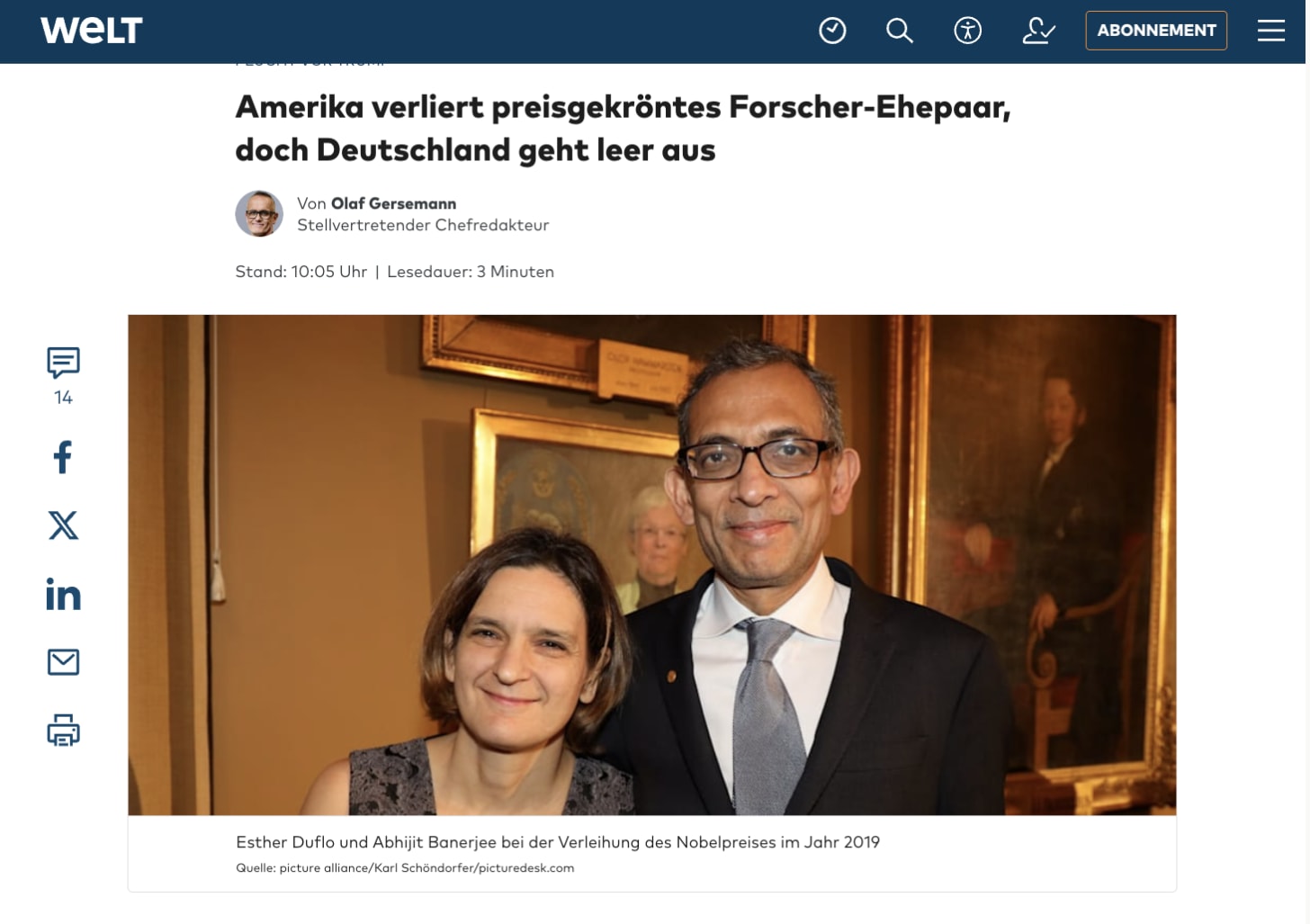Hunger is not the main problem, says Esther Duflo. Televisions are more important than food, adds Abhijit Banerjee, her husband.
Bold claims. But Duflo and Banerjee are not just masters of provocative soundbites — they have long enriched the field of poverty research with groundbreaking and innovative approaches. She grew up in France, he in India. For many years, they have worked together at MIT. They married in 2015 and received the Nobel Prize in Economics together in 2019.
Arguably, they are the second most famous economist couple in the world, right after Nobel laureate George Akerlof and his wife, former Fed Chair and U.S. Treasury Secretary Janet Yellen.
Now, in 2026, Duflo and Banerjee are leaving the U.S. for Europe.
In early 2025, media on both sides of the Atlantic buzzed with reports: Top scientists, frustrated and disillusioned by Donald Trump’s second presidency, were considering fleeing the U.S. The idea was that, with the right conditions, Germany and the rest of the EU could benefit from the anticipated “brain drain.”
The decision by Duflo and Banerjee to leave the U.S. can likely be read in this context as well. Duflo, for example, had described Trump’s cuts to development aid in spring as a “bloodbath.”
But the pair isn’t coming to the EU — they’re moving to Switzerland, to the prestigious University of Zurich.
In Germany, initial grand announcements were followed by... not much. Patrick Cramer, President of Germany’s Max Planck Society, even traveled to the U.S. in spring, hoping to speak with star scientists who might be open to relocating — “the kind that make my eyes sparkle,” he said.
After returning, however, Cramer spoke only vaguely about “expecting more applications soon.”
Meanwhile, leading social scientists in Germany, including four of the five “Wirtschaftsweisen” (the German Council of Economic Advisers), proposed a “Meitner-Einstein Program” to fund 100 professorships for U.S. scholars under political pressure.
Nothing has been heard of that proposal since.
Still, efforts haven’t been entirely abandoned. The state government of Baden-Württemberg, for instance, wants to become a “magnet for international top-tier research,” as Minister-President Winfried Kretschmann announced at the end of September.
And at the end of July, Federal Research Minister Dorothee Bär launched the “1000 Köpfe plus” program — or “Global Minds Initiative”, as it’s called in English.
The goal: to offer “international stars and talents a future in the German science system” — a “clear signal for academic freedom,” as Bär put it.
With a proposed budget of €50 million for 2026, the program leaves just a five-figure annual sum available per researcher. Kretschmann’s “Global Partnership in Science,” targeting Harvard scholars, is similarly scaled — €24 million in total, for all researchers involved.
Switzerland, by contrast, is playing in a different league. For the Duflo-Banerjee coup, University of Zurich secured the support of a generous benefactor: Jorge Paulo Lemann, a Brazilian-Swiss billionaire. According to Swiss daily “Tages-Anzeiger”, Lemann’s foundation is funding two endowed professorships for the couple — and the launch of a new research center.
Lemann is contributing 26 million Swiss francs — around €28 million — for this project alone.
+++
This is a modified version of an article that is published in German this weekend in “WELT AM SONNTAG” — and on welt.de.
.png)






